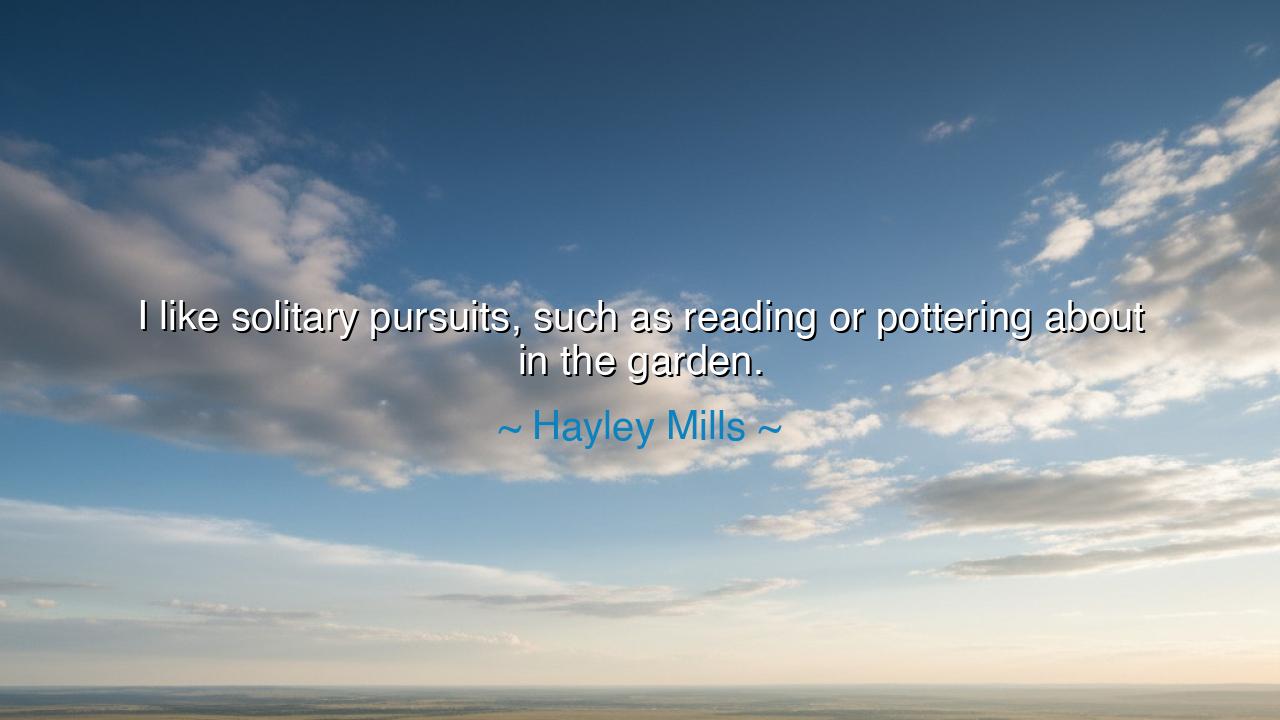
I like solitary pursuits, such as reading or pottering about in






O Seekers of Reflection, gather closely and hear the words of Hayley Mills, for within her simple confession lies a deep understanding of the human need for solitude. "I like solitary pursuits, such as reading or pottering about in the garden." In these words, Mills speaks to the heart of solitude, a powerful force that is too often misunderstood in the world today. We are surrounded by noise, by distractions, by the constant pressure to be ever connected to others, but in solitude, there is a different kind of strength—a strength of spirit, of mind, and of self. Solitude is not an absence, but a presence; it is the space where we come face to face with our truest selves.
The ancients knew well the value of solitude. Socrates, the great philosopher of Athens, often withdrew from the chaos of the city to reflect in the quiet of nature. For him, the solitary moments spent pondering the mysteries of life were as essential as the discussions held in the bustling agora. In solitude, he could hear the whispers of wisdom, not distorted by the noise of the world. Just as Mills finds peace in reading and gardening, Socrates found clarity in these moments of quiet contemplation. Reading, much like gardening, is an intimate pursuit—it is an act of cultivation, where we plant seeds of knowledge in the soil of our mind and wait patiently for them to grow into understanding.
Consider, O Seeker, the example of the monks of the medieval period, whose lives were devoted to both solitude and work. These ascetics withdrew from the noise of the world, finding their connection to the divine in the silence of their monasteries. The monks' lives were marked by long hours of reflection, study, and prayer, and yet, through their gardens, they cultivated not only their food but also their spiritual lives. Gardening, as Mills suggests, was not merely an act of labor, but a deeply meditative process. It was in the quiet care of the garden that the monks found clarity, peace, and communion with the divine. In the stillness of the earth, they discovered the rhythms of life and the divine presence in every leaf and every flower.
But there is more to solitary pursuits than mere contemplation. The quiet act of pottering about in the garden, as Mills so beautifully describes, is an act of connection—a connection to the earth, to the cycles of nature, and to the spirit within us all. In the garden, there are no distractions, no demands from the outside world. There is only the earth, the plants, and the steady work of tending to them. This simple, humble task teaches us that sometimes the greatest moments of growth and understanding come not from grand actions or external achievements, but from the quiet, consistent effort of simply being present with what is before us. In every task—whether reading a book or pulling a weed—there is an opportunity for reflection and personal growth.
In the story of Buddha, we find a perfect example of this kind of solitude and nourishment. Before he became the Enlightened One, Siddhartha Gautama spent years in solitude meditating under the Bodhi tree, seeking truth and wisdom. It was in these solitary moments that he came to understand the nature of suffering, attachment, and enlightenment. In the quiet, he was able to cultivate not only his mind, but also his spirit. Just as Mills finds joy in solitary pursuits, so too did Buddha find the highest truths in his solitude. The lesson here is that solitude is not merely about isolation, but about creating space for true growth and understanding.
Now, O Seeker, consider what this means for your own life. The lesson is clear: in a world that pulls us in every direction, it is in solitude that we find the true connection to ourselves and to the world. The solitary pursuits—whether reading, gardening, or meditative reflection—are not merely escapes from the world, but acts of nourishment. They are moments when we cultivate not only the earth, but our souls, preparing us for the challenges and joys of the world. The quiet acts of tending to our inner lives allow us to face the world with greater clarity and understanding.
So, O Seeker, embrace your moments of solitude. Take time to retreat into the garden, to open a book, or to sit in quiet reflection. Recognize that these moments are not indulgent or wasteful, but essential to your well-being. In the solitude, you will find not only peace, but wisdom. Just as the gardener nurtures the plants with quiet care, so must you tend to your own spirit. In these moments of solitary pursuit, you will discover that you are never truly alone, for in the silence, you are in communion with yourself and the world around you.
May your journey through solitude lead you to greater clarity, peace, and understanding, and may you always find strength and joy in the quiet, for it is there that you will truly hear the whispers of the soul.






AAdministratorAdministrator
Welcome, honored guests. Please leave a comment, we will respond soon